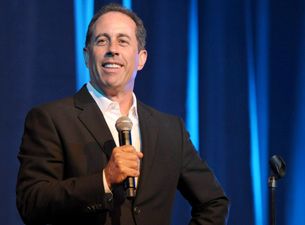Being a stand-up comedian is a very tough job. Standing in front of people is never easy, but standing in front of people who judge everything you say and expect to laugh every few seconds is much harder. We are used to hearing about famous, successful comedians such as Chris Rock, Jerry Seinfeld and Sarah Silverman, but there are thousands of other comedians in various stages of their career and many thousands more of aspiring and amateur comedians which most likely never reach the success or fame they wish for.

As someone focusing on humor research, I find stand-up comedy fascinating. I wanted to know more about the business and especially about the comedians themselves. What motivates them to become comedians? Do they have unique personalities? Are they more intelligent than ordinary people? What are the daily lives of comedians like? Unfortunately, there are very few studies that have investigated the life of comedians, maybe because they are considered non-serious people to study. For some reason, there is much more research on other artistic and creative groups such as writers, poets, musicians, actors and dancers - all very serious people! My research on comedians was the first scientific study on that group in 30 years! I tried exploring the uniqueness of stand-up comedians, and in the upcoming posts I would like to share some of the findings and insights about comedians and comedy that I have explored in my research.
As light-hearted as it seems to study comedy and comedians (and humor in general), it is important to note that studying stand-up comedians is a serious business that has important implications for understanding humor and creativity in general. While professional comedians may not embody ordinary uses of humor, studying extreme levels of humor ability could still shed light on everyday humor. Comedians may not represent the average person, but studying comedians can help illuminate what people find funny and what they don’t, and also help understand the creative process in general. It is just like criminologists studying murderers when trying to understand general patterns of violence (I know, a morbid comparison).
One of the things that I was curious to find out about comedians was what distinguishes them from other artistic vocational groups. Artists differ from each other in many ways, and one important distinction is between creators and performers (also called interpreters) (credit to Nat Kogan who made this distinction first). Creators are people that produce a work of art that others usually perform or do not need a performer. Examples are writers, poets, composers, and choreographers. Performers are people that use their artistic skills to perform other people’s work. Such are musicians, actors, and dancers. Granted, sometimes a person could be both at the same time as in the case of singers singing their own songs, but this is not a requirement of the profession. Comedians, on the other hand, are different. The distinction between creators and performers is blurry, as comedians must perform their own creation. No other art, besides stand-up comedy, requires that the artist will both create and perform his own act.
What are the implications of being both a creator and a performer? We will get to that in a moment, but first let’s take a look at how comedy in America works, and some of the distinct characteristics of the lives of comedians.
Comedians come in all forms and shapes. There is no formal education or specific course work you need to take in order to become a comedian, and I have met comedians that were high school dropouts on one hand, and others that hold a PhD degree on the other. Their level of formal education tells us nothing about how good they are as comedians.
Many people want to become a comedian, but very few succeed or have the endurance to overcome failures. Stand-up comedy is a very competitive field with little job security. You might be considered a great comedian today, but nothing guarantees that the audience will love you tomorrow. Or next month. Each performance on stage is unique with its own interaction with the crowd. Jokes that put the audience on the floor one night, may not work the next night at the same club.
There are different levels of comedians. If you are an aspiring comedian you might want to submit a video of your act to a local comedy club. Most clubs hold amateur nights where basically anyone can come and perform on stage for 2-3 minutes. If you are good, you might be invited to become an opener for a show. An opener performs the first act that usually lasts between 10-15 minutes. He or she also serves as the emcee for the evening. These are comedians in the early stages of their career, and they usually receive very little compensation, if any. If you are good as an opener (and that might take several years to master), you could advance to the next level and become the feature guy. These are experienced comedians that have been in the business for several years, and their act is usually about half an hour. The next level is the headliner, the guy that is advertised in all the billboards by the club prior to the show. He or she performs between an hour to an hour and a half. It might take 15-20 years to become a headliner, and most comedians will not reach that level of success. But if you become one, you are at the pinnacle of the comedy profession (as far as comedy clubs, at least).
This is a typical setting for a comedy club. Of course, if you are Chris Rock or Ricky Gervais, you often perform in huge venues, and then there is usually just an opener before you go on stage. Nonetheless, even very successful comedians such as Jerry Seinfeld, cannot come up with an hour of material without testing it on smaller crowds. They will often go and perform short acts of new material in small comedy clubs, many times without any advertisement for their appearance as they build their way into a full act (you can see how it unfolds with Seinfeld in the movie “Comedian”).
Besides the grueling career that is awaiting the comedians, their everyday is not easy, either. Most comedians do not have agents to manage their career and have to do everything by themselves. That means that they have to promote themselves, book their shows with the club managers, write and practice their materials, all of this while getting relatively low pay and often have to work at another job. It might take an average of 10-15 years for a comedian to be able to live off of comedy alone. And they have to do all of this without union support, as there is no guild for comedians. Heck, there isn’t even a list of all clubs and comedians that allows managers and comedians to connect with each other. Reputation is key, and if you are a good comedian, club managers will spread the word about you to other managers, who will then invite you to perform in their clubs.
Oh, and did I mention the extensive travel involved? To succeed in the business you must travel a lot. It is one thing to be funny in front of your friends or at a friendly club where everyone knows you, but it is a different thing to go on the road and perform in front of new crowds that have never heard of you and have a completely different demographic. For example, older and more traditional audiences can have completely different tastes than young and liberal ones. Great comedians will know to adjust and succeed almost everywhere, but this takes time and experience. Many comedians will travel between 40-50 weeks a year, usually performing Thursday to Sunday (staying often at a not so pleasant condo owned by the club to save money). These half week at home, half week on the road schedules make it very difficult to sustain a home life or another job. And imagine how hard it is to maintain a steady relationship with so much traveling (though casual sex can be great. More on this later). You sometimes wonder why the hell people want to become a comedian in the first place!
In the next post, I will write about some of the unique personality and other traits of comedians (you can find it here).




